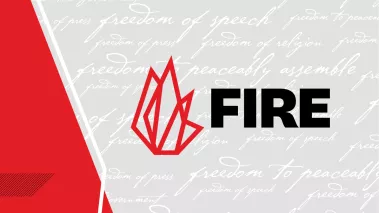Table of Contents
This Month in FIRE History: The End of a Free Speech Zone at West Virginia University

Seven years ago this month, FIRE won our first victory against a so-called "free speech zone" at West Virginia University. The policy, which quarantined free expression to two small areas of campus, was brought to FIRE's attention by the leaders of the West Virginia University Free Speech Consortium, Michael Bomford and Matthew Poe. It took many letters, a public exposure campaign, and a lawsuit from the Rutherford Institute for the university to adopt a new policy that declared all of campus a "free speech zone."
Since that time, FIRE has defeated similar free speech zones on campuses across the nation, including the University of North Carolina at Greensboro, University of Nevada at Reno, Citrus College in California, and the "Free Speech Gazebo" at Texas Tech University.
For example, in the fall of 2007, after FIRE first became involved in Hayden Barnes' infamous case at Valdosta State University (VSU), we learned of the university's incredibly restrictive "Free Expression Area." The tiny area, which represented less than 1% of Valdosta's 168-acre campus, restricted "persons wishing to speak on campus" to two nonconsecutive hours per day (12-1 PM and 5-6 PM), and only after providing VSU administrators with two days' advance notice. Fortunately, due to unrelenting pressure from FIRE and welcome leadership from incoming president Patrick J. Schloss, Valdosta State changed its policy to comply with the First Amendment in September of 2008. Check out the video about VSU's former policy:

FIRE's case at West Virginia was an important victory for freedom of expression that gave us momentum to oppose speech zones elsewhere. As Greg Lukianoff said in a letter to WVU at the time:
A university serious about the search for truth should be seeking at all times to expand open discourse, to foster intellectual inquiry, and to engage and challenge the way people think. By limiting free speech to a tiny fraction of the campus, you send the message that speech is to be feared, regulated, and monitored at all times. This message is utterly incompatible with a free society and stands in stark opposition to the ideals of higher education.
We continue to publicly oppose free speech zones such as WVU's former policy. We are currently working to lift the absurd policy at Southwestern College (California) that restricts expression to a "Free Speech Patio."
Recent Articles
FIRE’s award-winning Newsdesk covers the free speech news you need to stay informed.

‘Executive Watch’: The breadth and depth of the Trump administration’s threat to the First Amendment — First Amendment News 465

University of Wisconsin academic freedom panel back on after effort to disinvite speaker

UConn Med now lets students opt out of DEI pledge of allegiance
